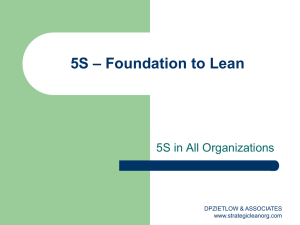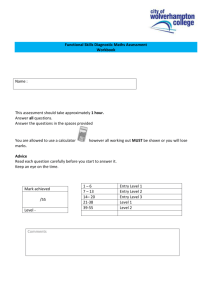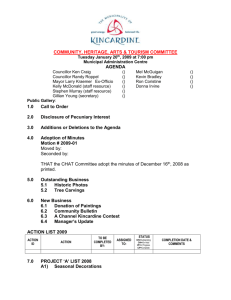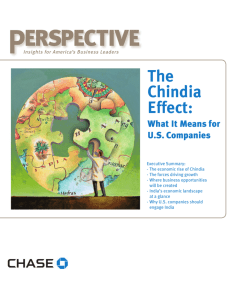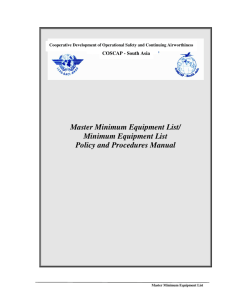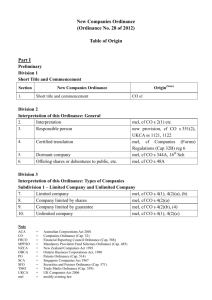Chindia - book review
advertisement
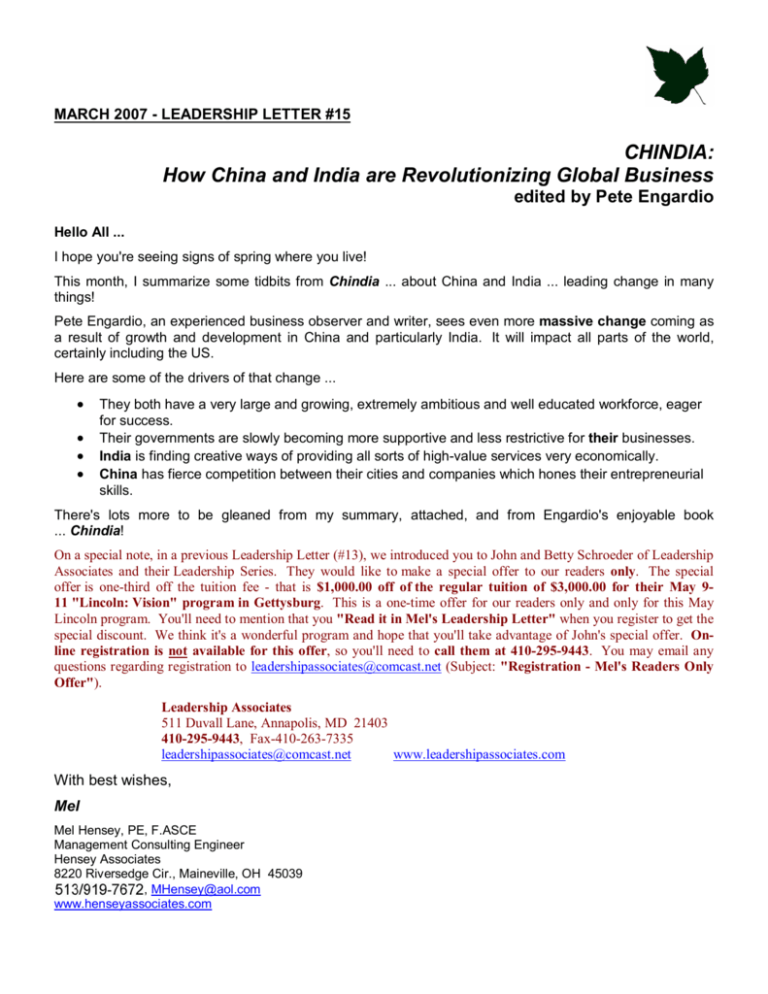
MARCH 2007 - LEADERSHIP LETTER #15 CHINDIA: How China and India are Revolutionizing Global Business edited by Pete Engardio Hello All ... I hope you're seeing signs of spring where you live! This month, I summarize some tidbits from Chindia ... about China and India ... leading change in many things! Pete Engardio, an experienced business observer and writer, sees even more massive change coming as a result of growth and development in China and particularly India. It will impact all parts of the world, certainly including the US. Here are some of the drivers of that change ... · · · · They both have a very large and growing, extremely ambitious and well educated workforce, eager for success. Their governments are slowly becoming more supportive and less restrictive for their businesses. India is finding creative ways of providing all sorts of high-value services very economically. China has fierce competition between their cities and companies which hones their entrepreneurial skills. There's lots more to be gleaned from my summary, attached, and from Engardio's enjoyable book ... Chindia! On a special note, in a previous Leadership Letter (#13), we introduced you to John and Betty Schroeder of Leadership Associates and their Leadership Series. They would like to make a special offer to our readers only. The special offer is one-third off the tuition fee - that is $1,000.00 off of the regular tuition of $3,000.00 for their May 911 "Lincoln: Vision" program in Gettysburg. This is a one-time offer for our readers only and only for this May Lincoln program. You'll need to mention that you "Read it in Mel's Leadership Letter" when you register to get the special discount. We think it's a wonderful program and hope that you'll take advantage of John's special offer. Online registration is not available for this offer, so you'll need to call them at 410-295-9443. You may email any questions regarding registration to leadershipassociates@comcast.net (Subject: "Registration - Mel's Readers Only Offer"). Leadership Associates 511 Duvall Lane, Annapolis, MD 21403 410-295-9443, Fax-410-263-7335 leadershipassociates@comcast.net www.leadershipassociates.com With best wishes, Mel Mel Hensey, PE, F.ASCE Management Consulting Engineer Hensey Associates 8220 Riversedge Cir., Maineville, OH 45039 , MHensey@aol.com www.henseyassociates.com CHINDIA HOW CHINA AND INDIA ARE REVOLUTIONIZING GLOBAL BUSINESS Edited by Pete Engardio, Sr. Writer for Business Week ISBN-13: 978-0-07-147657-7 McGraw-Hill 2007 Pete Engardio s book is jam-packed and encyclopedic, yet concise and very helpful. It s also intriguing and intimidating. In the coming decades, China and India will disrupt workforces, industries, companies and markets in ways that we can barely begin to imagine. (page 23) Both India and China have large and growing technical resources such as engineers and scientists, many of whom are entrepreneurial. Together, they graduate a half million per year vs. 70,000 in the US. Together, China and India s GDP is only 6% of global GDP, half that of Japan. However, China s GDP is growing at 9%/year and India s at 7%! As almost everyone knows, China has become the world s manufacturing hub with high and improving quality for many products. India has become the world s software, technology and services hub. As Cisco s Scheinman says: We came to India for the costs, we stayed for the quality, and we re now investing for the innovation. John Ciacchella of A.T. Kearney: I don t think US companies realize India is building next-generation service companies. Management guru C.K. Prahalad notes that Indian companies are learning the art of serving the masses by selling air flights, small business loans, even cardiac surgery, at a fraction of our costs. Financially, India s advantage is that Indian entrepreneurs have learned how to produce excellent services with new business models and very low costs in spite of little investment, bureaucratic government impediments and poor infrastructure. China s financial advantage is their high rate of savings (50%!), ferocious entrepreneurial competition within, in spite of high development costs (3 to 4 times ours) and poorly performing banks with whimsical investment practices. Exc-Chindia-1-19-07 1 Both have an advantage of many young people with ambition, rising and unmet needs, high unemployment, entrepreneurial opportunities, high rates of literacy and improving education. Due to the one baby/family policy, China s young people are a smaller percentage of the population, leaving India at an advantage. A minority view, but well reasoned, is that long-term, India will surpass China in economic growth by say mid-century, because of More and better managers as a percent of population. Rising openness to foreign trade and investment, compared to China. Strength in high-end manufacturing that requires a lot of engineering ( an order of magnitude beyond what China is doing ). Younger people are a larger percent of their population and will grow. Increasing savings rate coupled with a more productive use of capital. I would add 2 others English vs. many dialects Democratic government. Wrenching Change: McKinsey s Global Institute foresees that as more IT and technical jobs are off-shored to India, 60% or more of impacted US workers will find work at incomes 30% less, at best. The China Price is already doing this to US manufacturing which will survive through innovation and productivity but at much lower costs. China s competitive advantages aren t just unfair practices; some 70% of their exports come from companies owned by Taiwan, Hong Kong, Japan and the USA. Rising wages in both China and India will help ameliorate this wrenching change in the US, but how soon and how much? This excellent book is required reading for anyone in business. It will give you a needed heads-up on competition. But, it will also give you insights into new business models, approaches and advantages. Reviewed by Mel Hensey, PE, Management Consulting Engineer Hensey Associates, MHensey@aol.com January 2007 Exc-Chindia-1-19-07 2

